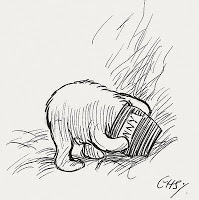I’m carrying on with republishing my notes on my Bible studies on Revelation that I did after spending a week looking at that interesting book on Contagious. I wrote this back in January 2004.
Revelation Recap #4: Letter to the Church in Thyatira
Chapter 2:18-29
Jesus’ description of himself:
“The Son of God” “Eyes are like blazing fire” “Feet are like burnished bronze”
The way Jesus decribes himself in these letters always relates to what he has to say in showing that he has the power and authority for what he says to the church. Hence, I’ll come back to these descriptions when I come to the parts of his letter they are referring back to. The second and third description refer back to the description of Jesus in Chapter 1, but this is the first time in Revelation that he is referred to as “the son of God”, and this could do with a bit of “unpacking”.
It links into the quote from Psalm 2:9 in verse 27. The psalmist has been asking “Why do the nations conspite and the peoples plot in vain?”, and the immediate context, Psalm 2:7-9 reads:
“I will proclaim the decree of the Lord: He said to me, “You are my Son; today I have become your Father. Ask of me, and I will make the nations your inheritance, the ends of the earth your possession. You will rule them with an iron sceptre; you will dash them to pieces like pottery”
The Old Testament contains various references to Israel being God’s son – other examples are 2 Samuel 7:14 and Hosea 11:1. This is one of the ways in which Jesus identifies himself as fulfilling the Old Testament. Funnily enough, another way in which he does this came up in the sermon I heard this morning: in John 15, Jesus says that he is “the vine”, and image also used of Israel in Pslam 80 and Isaiah 4. But what Jesus is showing here is the passing down of authority. We are now the sons, the children, of God – see John 1:12 and Galatians 4:7, for example.
He praises the church for:
Their deeds, love and faith, service and perserverance, and that they are doing more than at first. Pretty good stuff! We’d do well to follow their example.
He rebukes the church for:
Tolerating “that woman Jezebel, who calls herself a prophetess. By her teaching, she misleads my servants into sexual immorality and the eating of food sacrificed to idols”.
“Toleration” is something that people today value very highly, but here we see Jesus’ anger at his people being led into sin due to false teaching. We shouldn’t stand by while people teach wrong doctrine leading to sin. This seems particularly striking to me given the current situation regarding divisions in the church about homosexuality, although that is just a symptom of the more serious problem of division over the authority of the Bible. Something to pray about.
Another interesting thing is that the Thyatirans seemingly chased after deeper knowledge. – “Satan’s so-called deep secrets”. Many a dodgy doctrine comes from new ideas that supposedly allow us to be more deeply spiritual, and so on. In reality, the Bible teaches that “All Scripture is God-breathed and is useful for teaching, rebuking, correcting and training in righteousness, so that the man of God may be throughly equipped for every good work”. While other sources – tradition, wise teachers, books and so on – are often helpful so far as they agree with Scripture, everything we need for living a godly life is in his Word.
Also, according to “The Returning King“, the word used in the Greek for “burnished bronze” appears nowhere else, and may be the trade name for the special kind of bronze made by Thyatira’s guild of bronze workers using a secret process, so Jesus is demonstrating his knowledge of all things. The eyes of balzing fire also represent his knowledge of peoples “hearts and minds” (v23).
What Jesus promises:
He promises both punishment and reward, a recurring theme through Revelation. But there is always the opportunity to repent. I heard that the name “Methuselah” (who died in the year the Flood occured, taking all the ages in the genealogies in Genesis literally) translates to something like “God will judge” – appropriately, he was the longest-lived man in the Bible!
Jesus promises that he will “give authority over the nations… just as I have received authority from my Father”. This is where the whole “Son of God” business comes in – it shows us that he does have that authority, and that he can give authority to us. We are the “sons of God”, and through Jesus, and then through us, the rebellion against God will cease, as we see in Psalm 2 God has planned. This then relates to the whole idea of the Kingdom of God – we should live our lives under God’s kingship, that is, obeying his teaching, and seek to bring others into the kingdom, that is, them becoming Christians and giving their lives to him.
So there we are – Jesus has knowledge and authority, which he passes on to us. Praise the Lord! We need to hold to his true word, and seek to “dash to pieces” the rebellion against God, by changing our behaviour and by seeking to tell others about him and bring them to Christ. I know I’ve got plenty to work on there!
Tags: Bible study Revelation



